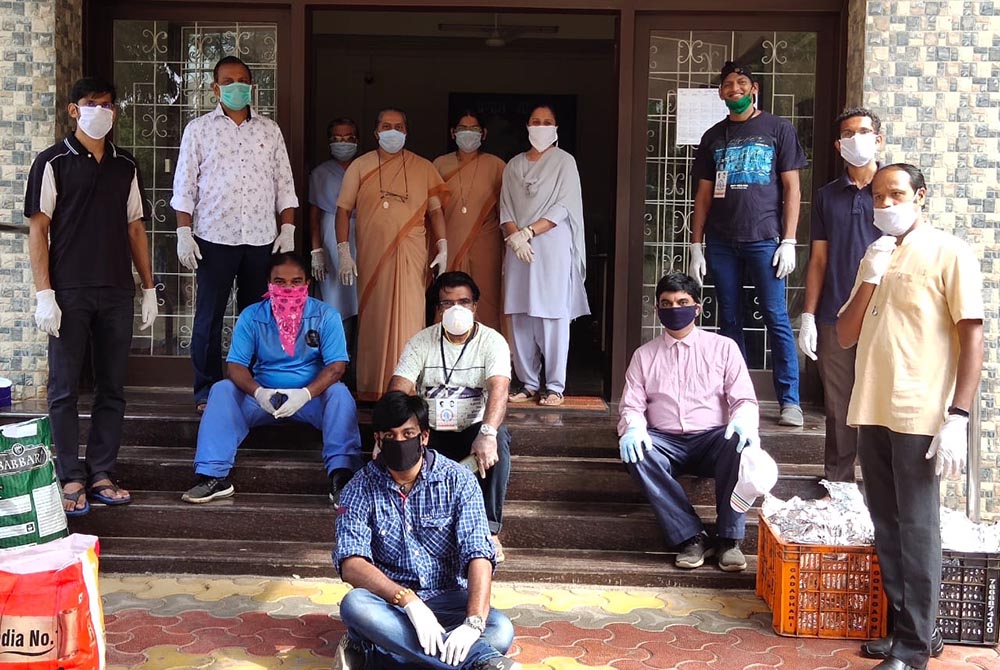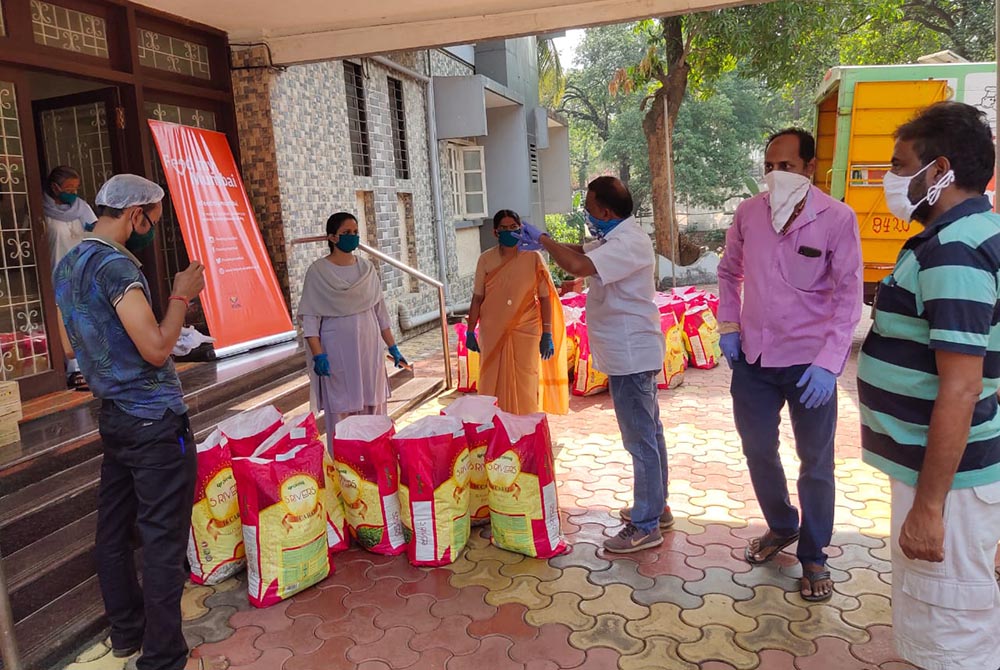
Pictured are lay volunteers (former pupils of the St. Dominic Savio Salesian School) who help provide resources for the needy, along with Salesian priests who help to transport the food, and some sisters. The distribution, called Feed my Mumbai Outreach by Canossians, is taking place in Mumbai out of our Canossian convent Nirmalashram. (Provided photo)
For the past few weeks an entirely new experience has engulfed us here in Mumbai. Living in a commercial metropolitan city like Mumbai, where lives are defined by "rush," and with everyone being busy all the time, I felt it too strange to see everyone locked up in their homes, struck more by a "panic" virus than by the coronavirus. These days are marked with panic and tension, with people hooked up to their social media, or channel surfing on their TVs, or browsing through various websites to know more about this virus — all filled with fear!
I remember the day when the women's self-help groups with whom we work were all excited about the upcoming Women's Day celebrations. Preparations for this annual event had begun almost two months before, and there was an air of celebration all around, everyone blissfully ignorant of the seriousness of the pandemic that had been announced recently by the World Health Organization. They were aware that it was happening in countries across the globe, but little did they know that it was knocking on our doors in India too. As I gathered them together and began discussing the seriousness of the pandemic, most of them were shell-shocked to think that this virus would hit us! Eventually we agreed to call off our celebrations. It did disappoint them and me too, but it served as a platform to inform them about the pandemic and educate them about the necessary precautions.
We spoke together about our fears and concerns and the safety measures we needed to take for ourselves and our families. But when it came to discussing social distancing we were all quite perplexed. In a place like Mumbai, already crammed with slums, social distancing remains a "concept" rather than a reality! How do we implement "quarantine measures" with people living in homes in close proximity with each other, or living in houses built of tin sheets occupying less than 350 square feet, who have to queue up to use public toilets and to fetch water from common sources?
A few days after this discussion, the lockdown was announced, causing misery for the millions of poor people in this country. In a telephone conversation, I was moved by the responses of one of the women from the slum, who said that she was worried about those who had no roof above them and had no place to go! I was touched that this poor woman of the slum was deeply concerned and distressed about the plight of another person poorer than her!
What she said was true, because the lockdown in the country has caused inconvenience to the thousands of the interstate migrants all over the country. The lockdown forced many of these laborers to head back home. With all transport coming to a standstill, it was a sad sight to see their plight as they were stranded on the streets. However, it was also consoling to see civil society, religious organizations and others besides social workers reaching out to them by providing them with shelter and food.
As we were trying to adapt and adjust ourselves to this new situation, we also sensed the helplessness of the poor and needy families around us. One of their concerns was the overcrowded grocery stores and the lack of availability of food. It was painful to feel their insecurity and anxiety as they struggled with their limited resources.

Sisters and volunteers planning for the distribution. (Provided photo)
Sensing the need of the hour, we took the plunge. We sisters decided to reach out to them by arranging rations for the families of daily laborers, the unemployed, domestic workers and other poor people living around us. The grocery store in the vicinity was running out of stock because of no means of transportation, and the government public distribution system was not yet operational. Placing our trust in God, we began this little ministry at a miniscule level with our own resources. We were aware that we didn't have enough resources for all of them. We felt like the disciples when Jesus asked them to feed the many hungry people who had come to listen to him. But we also knew that God's work is always sustained by Him, the giver and sustainer of life.
Divine providence came to our assistance in the form of a Hindu gentleman who volunteered to arrange for the groceries. We now realized that it was no more "our" project. The presence of lay volunteers is truly a sacred sign of God's presence. "Oh, what a sigh of relief and such a joy," said Sister Florence — an educator — as she saw the distribution taking place. "In this time of crisis food is the only means to reach out to the poor," she remarked.
The virus has made us realize the fragile nature of our existence and has generated ripples of oneness — a feeling of belonging to one large human family. It is so heartening to see volunteers come forward, unmindful of religion, caste or class barriers. The government has promised to reach out to the poor through free rations. We are trying to collaborate with the government in order to speed up this process of obtaining rations for the poor.
While this is our "outside" work, we have a simultaneous "inner" work as well. The Canossian charism of being a "contemplative in action," an anchorite within and an apostle outside, seems to merge so beautifully in these moments. Our morning hours of chain adoration, which we initiated that the world may experience healing, and our outreach ministry of networking with government, civil society and nongovernmental organizations, blend well, enkindling a synergy of hope. It is a joy to pray together and a blessing to work together for the cause of the poor, particularly during these distressing times.
In these trying times, hopelessness can sometimes engulf us. The pain of seeing our people suffering, not just due to the virus, but due to hunger, can be the cause of hopelessness. But we see glimmers of hope even amidst this crisis, and we see that giving hope is our new ministry. This "hope" ministry finds creative ways — through telephone conversations, social media and through food distribution. Our lives have paused and are at a standstill but our spirits are alive. We hope that things will get better and we believe in his strength to hold on until the end — feeling reassured that, "He will swallow up death in victory: and the Lord God will wipe away tears from off all faces" (Isaiah 25.8).
[Lavina D'Souza is a Canossian sister from Mumbai, India. In her present ministry as the director of the social center in Mumbai, she uses rights-based approaches in community development programs.]
Advertisement





